
Walter Mosley, photo by Marcia Wilson
Walter Mosley is having a moment.
In an illustrious career that has spanned more than three decades and 60 books and been marked by accolades including the Mystery Writers of America Grand Master Award and PEN America’s Lifetime Achievement Award, 2023 is still shaping up to be among the most memorable.
It was recently announced that Mosley will receive this year’s prestigious CWA Diamond Dagger Award—which “recognizes authors whose crime writing careers have been marked by sustained excellence, and who have made a significant contribution to the genre.” Notably, he was also the recipient of their New Blood Dagger/John Creasey Award for his debut crime novel, Devil in a Blue Dress (1990), which introduced beloved postwar PI Easy Rawlins.
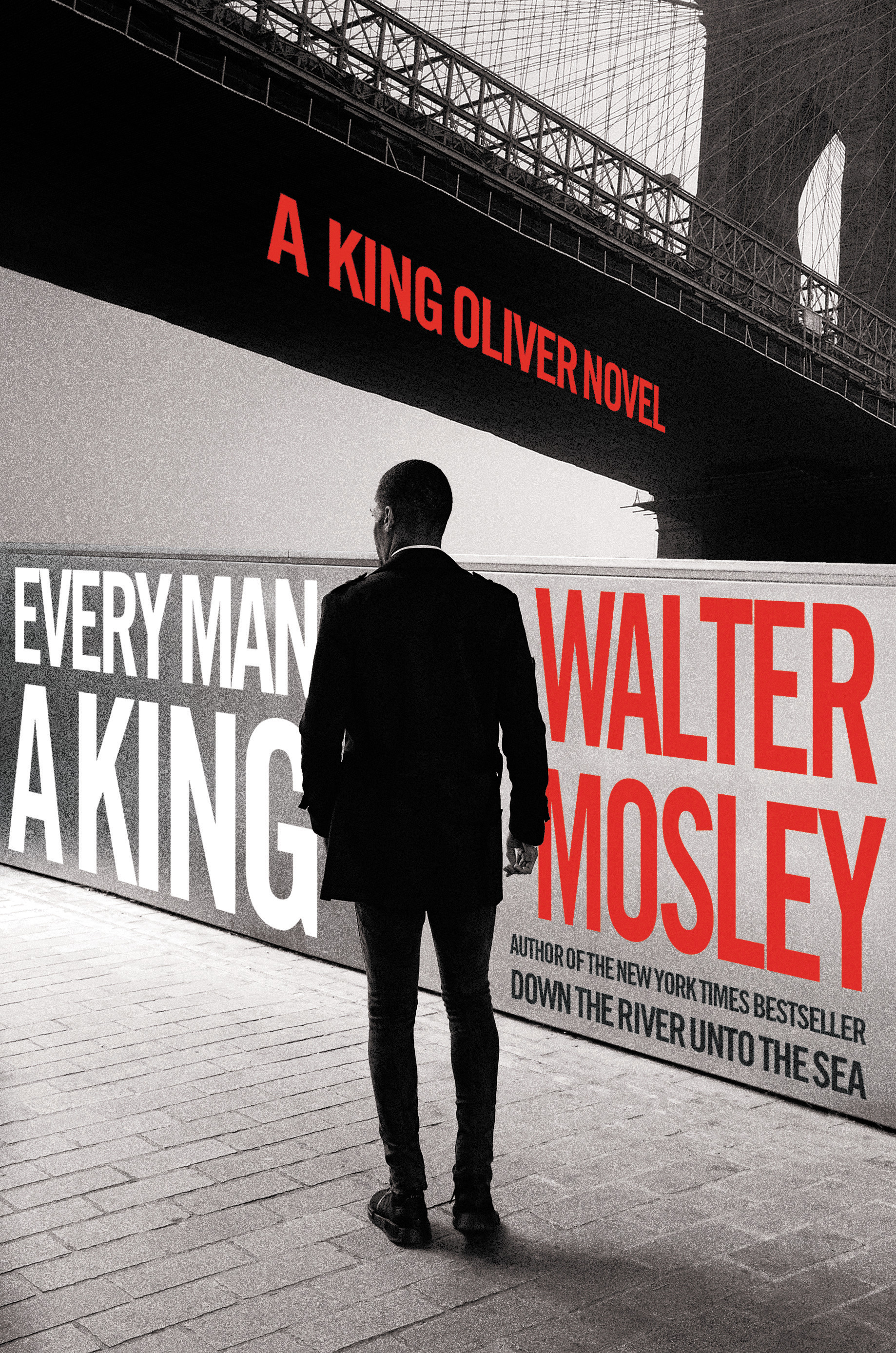 February also sees the publication of the highly anticipated Every Man a King (Mulholland Books)—the second book to feature Joe King Oliver, following 2018’s Edgar Award-winning Down the River Unto the Sea.
February also sees the publication of the highly anticipated Every Man a King (Mulholland Books)—the second book to feature Joe King Oliver, following 2018’s Edgar Award-winning Down the River Unto the Sea.
“Has it really been that long? That’s amazing,” Mosley marvels. “I always intended to come back to [Joe]. I find him interesting, you know.”
Perhaps some of that interest stems from the fact that Joe is a former NYPD cop turned private investigator living in the present-day world, whereas the author’s earlier series protagonists like Easy Rawlins and Army veteran Fearless Jones occupy space in bygone eras.
“In this particular side street of the genre that I'm in, most, or many, of the of the PIs were ex-police. And I've never done that.… It's almost an anathema to the kinds of people I'm writing about,” he says. “Easy and Fearless and people like that—I can't really write a contemporary story about them because they're in the past. You need a certain amount of innocence to do certain kinds of cases in New York.”
KING OF DETECTIVES
Joe King—a devoted family man and friend whose loyalty remains to the cause of justice—is still an “innocent” despite the system nearly destroying him.
“His commitment is to the law itself, even though the law has betrayed him. So that was what I was thinking when I was working on this—that he's the right guy,” Mosley remembers. “What came first—the detective or the case? I'm not sure. I think I probably wanted to write about the detective. So I discovered the story.”
In Every Man a King, Oliver family friend and money mogul Roger Ferris calls in a favor that has Joe investigating the potentially unlawful detainment of a White Nationalist, Alfred Xavier Quiller, who has been accused of murder and selling intel to the Russians. It’s an unenviable task, but one that Joe can’t refuse. After all, his beloved grandmother, Brenda, is not only alive but living again thanks to Ferris.
“She is in a relationship with him, and he’s basically brought her back to life,” Mosley notes. “Five years ago she was in the retirement home. And so [Joe] is not so much doing it for the multibillionaire. He’s doing it for his grandmother.”
But unlike hardboiled heroes of days past written by “the greats”—Mosley counts Raymond Chandler, Dashiell Hammett, and Ross Macdonald among them—Joe can’t simply disappear into the case.
“It was an existentialist genre, which it still is to some degree,” Mosley says. “Those detectives were doing what was right. And what was right for them and what's right for my character is different. In the present, you really need to talk about the complexities of a detective.”
Those facets extend beyond the professional realm and into the personal, where even crime-fighting crusaders must endeavor to balance their heroic escapades with humbler if equally important obligations closer to home.
“[Joe] has children. He has duties. He has friends. He has things that he is responsible for,” the author explains. “Which, in the old days, nobody really cared about.” Consequently, conflict between the two is inevitable. Here, Joe’s daughter (and aspiring partner), Aja, takes umbrage to his association with the White Nationalist Quiller, whose archaic and discriminatory beliefs—at least the publicly expressed ones—are in direct contradiction to their own.
Mosley paraphrases Joe’s response to Aja’s outrage, albeit in more simplistic terms: “Everybody’s racist. I’m racist. You’re racist…. America is racist from its very beginning.” It’s one of those fundamental (if frictious) truths that is perhaps more palatable when viewed through the lens of fiction, which provides just enough distance for rational contemplation over pure instinctive, emotional response.
“It's funny. I think that in fiction you can get closer to the truth,” he contends. “As a matter of fact, it's much harder to write true nonfiction than it is to write fiction because, in nonfiction, you take a realistic event, or moment in history, and then you start cutting away things…your own conscious and unconscious prejudices cause you to.”
A COMPLEX TRUTH
Another truth the author explores through imaginary circumstance is prison and its profound societal, economic, and emotional impacts.
“For Joe, incarceration is interesting,” Mosley says. “He was framed. He was thrown into the system by the authorities that existed. He was definitely going to be found guilty, if not killed in prison. [There’s] the terror of that happening …the injustice of it.”
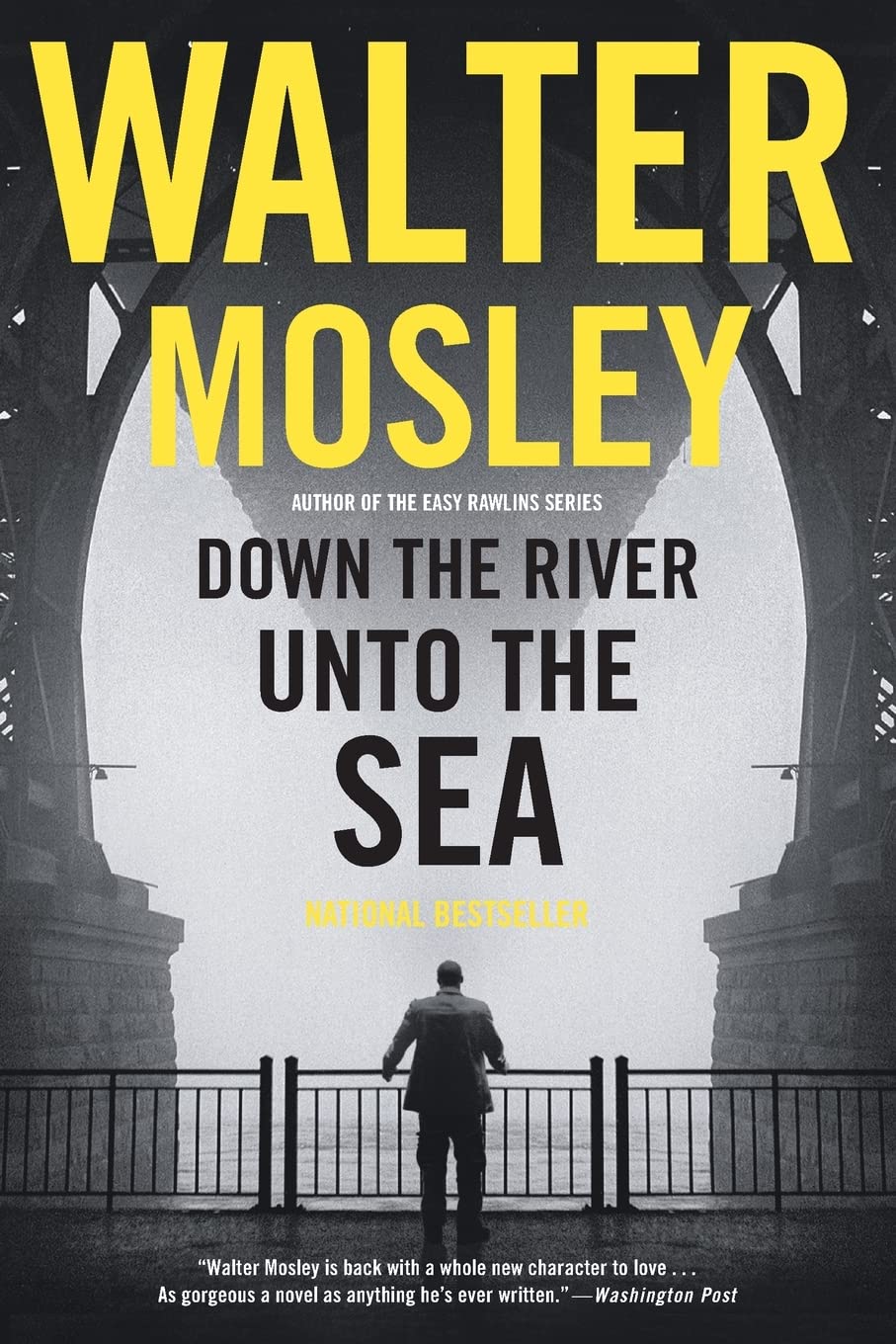 While redemption came for Joe in Down the River Unto the Sea, his personal demons resurface with a vengeance when he must visit Quiller at Rikers Island, the scene of his wrongful imprisonment.
While redemption came for Joe in Down the River Unto the Sea, his personal demons resurface with a vengeance when he must visit Quiller at Rikers Island, the scene of his wrongful imprisonment.
“I've had friends and acquaintances who've been in prison, and it was like: I'm not gonna let this break me down. This is who I am. And even when they came out, they were no longer criminals… [but] they still remember it. It's not that they were fond of it, but they had to deal with it,” says Mosley. “You do what you have to do to survive. And I think that Joe would have done that, also.”
Of course, survival requires resilience and the ability to make peace with factors beyond one’s control—and sometimes even risking exposure to the very things that haunt you.
“He discovers that his feelings are historical in nature, and that it was important for him to go back to the place where he was sent to prison to understand that he'd overcome that experience,” says Mosley. “That was really a fun part of the book for me—that he's growing as a character.”
Another part of his protagonist’s growth has been Joe’s learning to rely on others despite his inherent mistrust—an occupational necessity when his own life is threatened by formidable foes. “He needs somebody that he can trust,” Mosley says; it’s a predicament that will resonate with anybody who holds a mistrust of law enforcement. “He can work with the police. He can like the police. But he can’t trust them.”
Enter bodyguard and mercenary Oliya (“Olo”) Ruez—a decidedly lethal lady who harkens back to the fearless females of Mosley’s youth.
“Women can be as deadly as men…maybe even deadlier,” he asserts. “Black women in my family were just tough.… They had their gun. They had their knife. They said, ‘Well, you can mess with me…but you’d better kill me because otherwise I’m coming back.’
“I wanted that character,” Mosley says of Ruez, who he also modeled loosely on Hammett’s The Continental Op. “She’s not the toughest, but she’s tough enough. I think having those kinds of characters pulls us into the modern world, where we’re not thinking in the old ways…sugar and spice and everything nice.”
FRESH PERSPECTIVES
Mosley is quick to give a nod to fellow writers bringing fresh perspectives and updates to the crime storytelling tradition, contemporary writers whose works also celebrate continents and cultures that span the globe.
“I think Kellye Garrett is an important new writer,” he says. “Steph Cha…writes extraordinary stuff. People in my generation, like Gary Phillips…. They’re still putting stuff out there. So, if you start reading them, you can read more of them.”
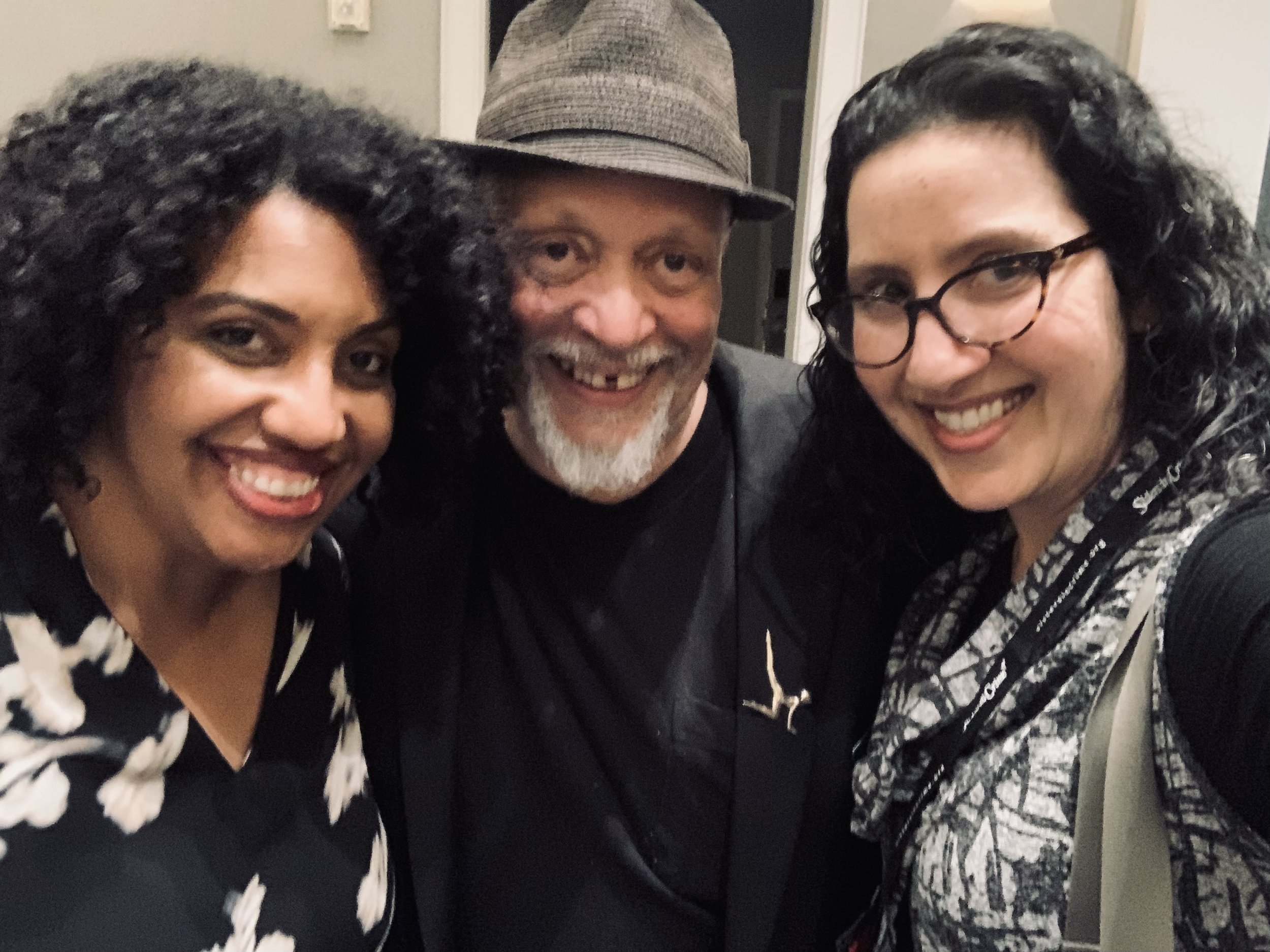
Crime Writers of Color cofounders (L-R) Kellye Garrett, Walter Mosley, and Gigi Pandian at Malice Domestic in 2022
The desire to amplify such voices led Mosley to cofound Crime Writers of Color (CWoC) with Garrett and Gigi Pandian in 2018.
“It’s pretty big now,” he says of the organization, which has grown to more than 350 members. “It reminded me of the old days of me and Gary Phillips and Gar Anthony Haywood and Eleanor Taylor Bland…. There was about ten of us and we used to go around doing readings and things. And I wanted, in a way, to recreate that.” He credits the younger generation of authors for CWoC’s grander, all-encompassing approach.
“Back then it was all just Black people,” Mosley recalls. “And now it’s people of color.… There are all different colors of people who want to see themselves in the literature…and they also represent a group of people who want to see themselves in the literature.”
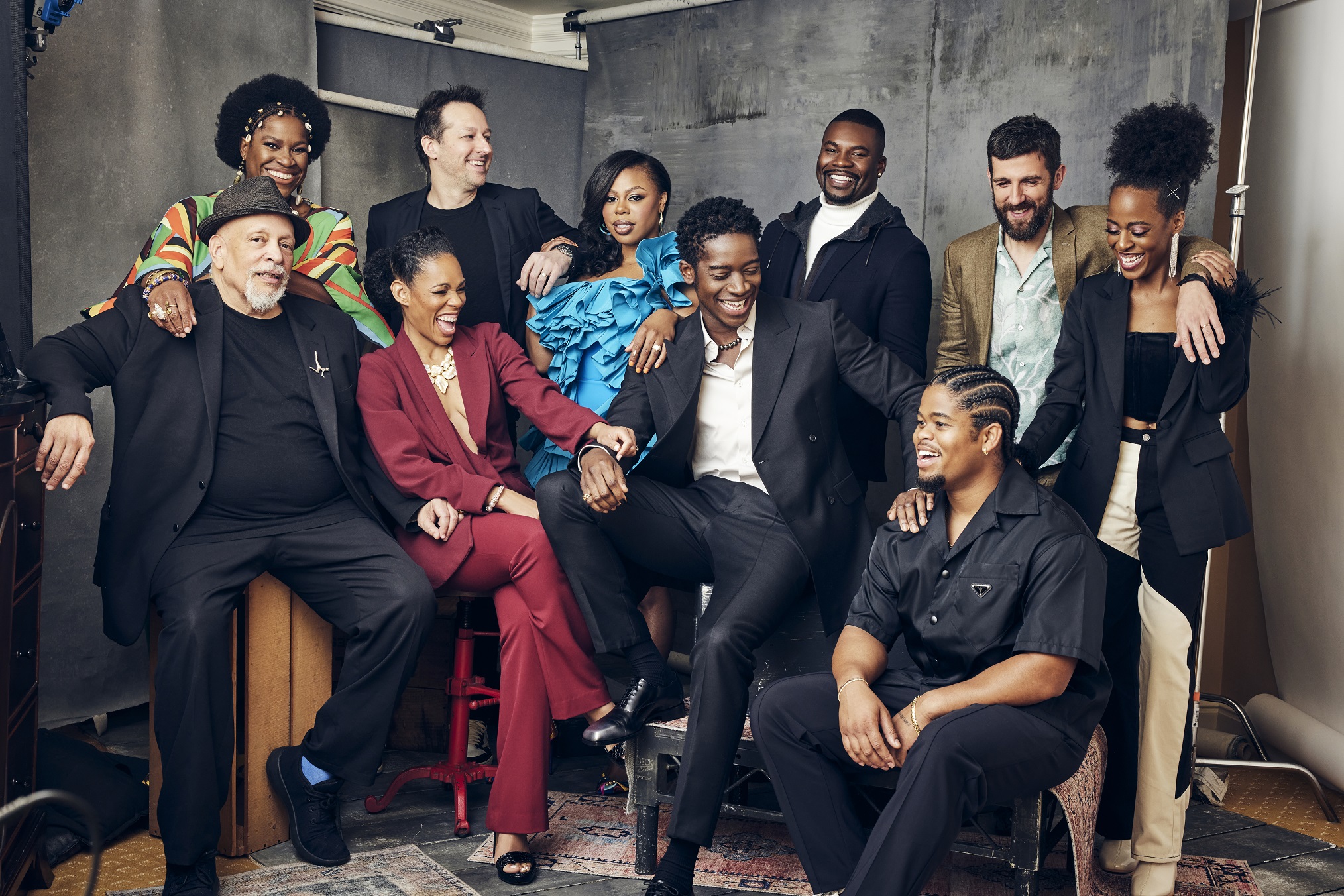
Walter Mosley with the cast of Snowfall: Michael Hyatt, Angela Lewis, Dave Andron, Gail Bean, Damson Idris, Amin Joseph, Carter Hudson, Isaiah John, and Devyn A. Tyler (Maarten de Boer/@iheartmaarten)
Mosley, then, sees the CWA Dagger Award—which, in conjunction with the MWA Grand Master title, he has referred to as the “apex” of his career (though certainly not an ending)—as not simply as an individual recognition but a collective one, giving validation to the direction and diversity of his collaborators and colleagues. “What we’re doing makes sense. Where we’re going makes sense,” he affirms. “I feel really good for myself getting the award…but I’m not just some lone guy out here doing it. It’s a whole movement of literature—and very important literature.”
It’s also one that will continue to be enhanced by the author’s future contributions.
Mosley anticipates the summer publication of a macro science fiction novella called Touched (“It’s about individual characters but it’s also about the history of the universe”). He has also completed a rewrite of the previously ebook-only Archibald Lawless, Anarchist at Large for reissue and identified a selection of short stories that haven’t yet been collected; he hopes to present those “more or less in order” so readers can see his stylistic progression.
Then, there’s a new Easy Rawlins novel percolating, its working title: Farewell Amethystine.
This proliferation comes at the conclusion of his duties as a writer and executive producer on the FX series Snowfall, which has ended after seven seasons.
“Wow, man, I can actually start writing in earnest,” Walter Mosley offers with a grin.
Which means the passing of this moment signifies many more to come.
A WALTER MOSLEY BIBLIOGRAPHY
waltermosley.com
Easy Rawlins mysteries
Devil in a Blue Dress (1990)
A Red Death (1991)
White Butterfly (1992)
Black Betty (1994)
A Little Yellow Dog (1996)
Gone Fishin’ (1997)
Bad Boy Brawly Brown (2002)
Six Easy Pieces (2003)
Little Scarlet (2004)
Cinnamon Kiss (2005)
Blonde Faith (2007)
Little Green (2013)
Rose Gold (2014)
Charcoal Joe (2016)
Blood Grove (2021)
Fearless Jones mysteries
Fearless Jones (2001)
Fear Itself (2003)
Fear of the Dark (2006)
King Oliver mysteries
Every Man a King (2023)
Down the River Unto the Sea (2018)
Leonid McGill mysteries
The Long Fall (2009)
Known to Evil (2010)
When the Thrill Is Gone (2011)
All I Did Was Shoot My Man (2012)
And Sometimes I Wonder About You (2015)
Trouble Is What I Do (2020)
Science fiction
Blue Light (1998)
Futureland: Nine Stories of an Imminent World (2001)
The Wave (2005)
Odyssey (2013)
Inside a Silver Box (2015)
Socrates Fortlow novels
Always Outnumbered, Always Outgunned (1997)
Walkin’ the Dog (1999)
The Right Mistake (2008)
Young Adult
47 (2005)
Other fiction
RL’s Dream (1995)
The Man in My Basement (2004)
Walking the Line (2005), a novella in the Transgressions series
Fortunate Son (2006)
The Tempest Tales (2008)
The Last Days of Ptolemy Grey (2010)
Parishioner (2012)
Debbie Doesn’t Do It Anymore (2014)
The Further Tales of Tempest Landry (2015)
John Woman (2018)
The Awkward Black Man (2020)
Erotica
Killing Johnny Fry: A Sexistential Novel (2006)
Diablerie (2007)
Nonfiction books
Workin’ on the Chain Gang: Shaking off the Dead Hand of History (2000)
What Next: An African American Initiative Toward World Peace (2003)
Life Out of Context: Which Includes a Proposal for the Non-violent Takeover of the House of Representatives (2006)
This Year You Write Your Novel (2007)
Twelve Steps Toward Political Revelation (2011)
Elements of Fiction (2019)
Graphic novel / Comic Book series
Maximum Fantastic Four (2005, with Stan Lee and Jack Kirby)
The Thing (2021–22) – Books 1 through 6
Crosstown to Oblivion series
The Gift of Fire / On the Head of a Pin, Tor Books, 2012
Merge / Disciple, Tor Books, 2012
Stepping Stone / The Love Machine, Tor Books, 2013
Plays
The Fall of Heaven, Samuel French, 2011
Lift, World premiere at Crossroads Theatre Company on April 10, 2014.
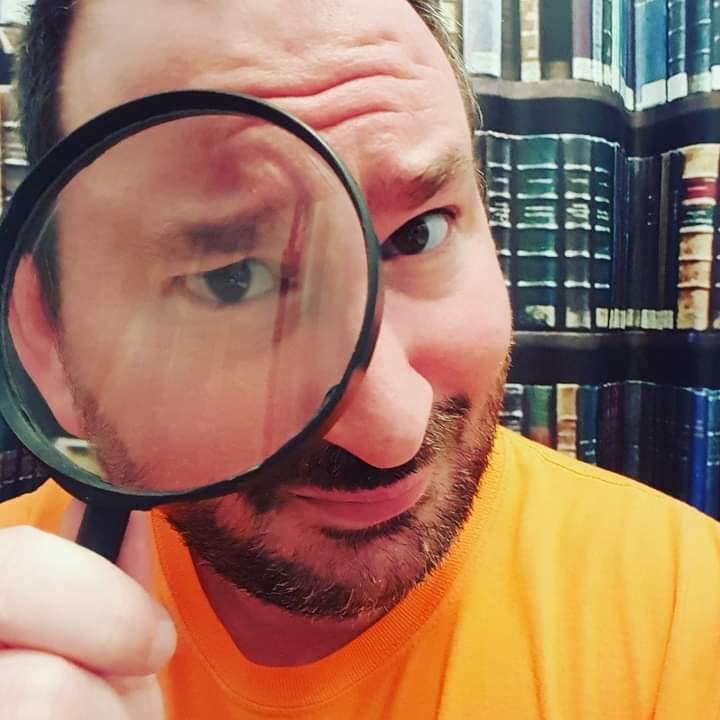 John B. Valeri is a lifelong lover of books and the people who write them and the host of Central Booking, where he interviews authors and other industry insiders. Valeri is a contributor to CrimeReads, Crimespree Magazine, Criminal Element, Mystery Scene Magazine, The National Book Review, The New York Journal of Books, The News and Times, The Strand Magazine, and Suspense Magazine. He regularly moderates author events and book discussions at bookstores and libraries throughout Connecticut, and serves on the planning committee for CrimeCONN, a one-day reader/writer mystery conference cosponsored by Mystery Writers of America/New York Chapter.
John B. Valeri is a lifelong lover of books and the people who write them and the host of Central Booking, where he interviews authors and other industry insiders. Valeri is a contributor to CrimeReads, Crimespree Magazine, Criminal Element, Mystery Scene Magazine, The National Book Review, The New York Journal of Books, The News and Times, The Strand Magazine, and Suspense Magazine. He regularly moderates author events and book discussions at bookstores and libraries throughout Connecticut, and serves on the planning committee for CrimeCONN, a one-day reader/writer mystery conference cosponsored by Mystery Writers of America/New York Chapter.








 February also sees the publication of the highly anticipated Every Man a King (Mulholland Books)—the second book to feature Joe King Oliver, following 2018’s Edgar Award-winning Down the River Unto the Sea.
February also sees the publication of the highly anticipated Every Man a King (Mulholland Books)—the second book to feature Joe King Oliver, following 2018’s Edgar Award-winning Down the River Unto the Sea. While redemption came for Joe in Down the River Unto the Sea, his personal demons resurface with a vengeance when he must visit Quiller at Rikers Island, the scene of his wrongful imprisonment.
While redemption came for Joe in Down the River Unto the Sea, his personal demons resurface with a vengeance when he must visit Quiller at Rikers Island, the scene of his wrongful imprisonment.

 John B. Valeri
John B. Valeri
 All He Has Left
All He Has Left

 That’s not to say my style is anything like my favorite authors. I love The Great Gatsby, but the world of Daisy Buchanan, Nick Carraway, and the denizens of West Egg is far afield from the thrillers I write. There’s no action on page one in Gatsby. And F. Scott Fitzgerald’s lyrical prose is nothing like the Strunk and White “omit needless words” approach I use to try to get readers to turn the page.
That’s not to say my style is anything like my favorite authors. I love The Great Gatsby, but the world of Daisy Buchanan, Nick Carraway, and the denizens of West Egg is far afield from the thrillers I write. There’s no action on page one in Gatsby. And F. Scott Fitzgerald’s lyrical prose is nothing like the Strunk and White “omit needless words” approach I use to try to get readers to turn the page.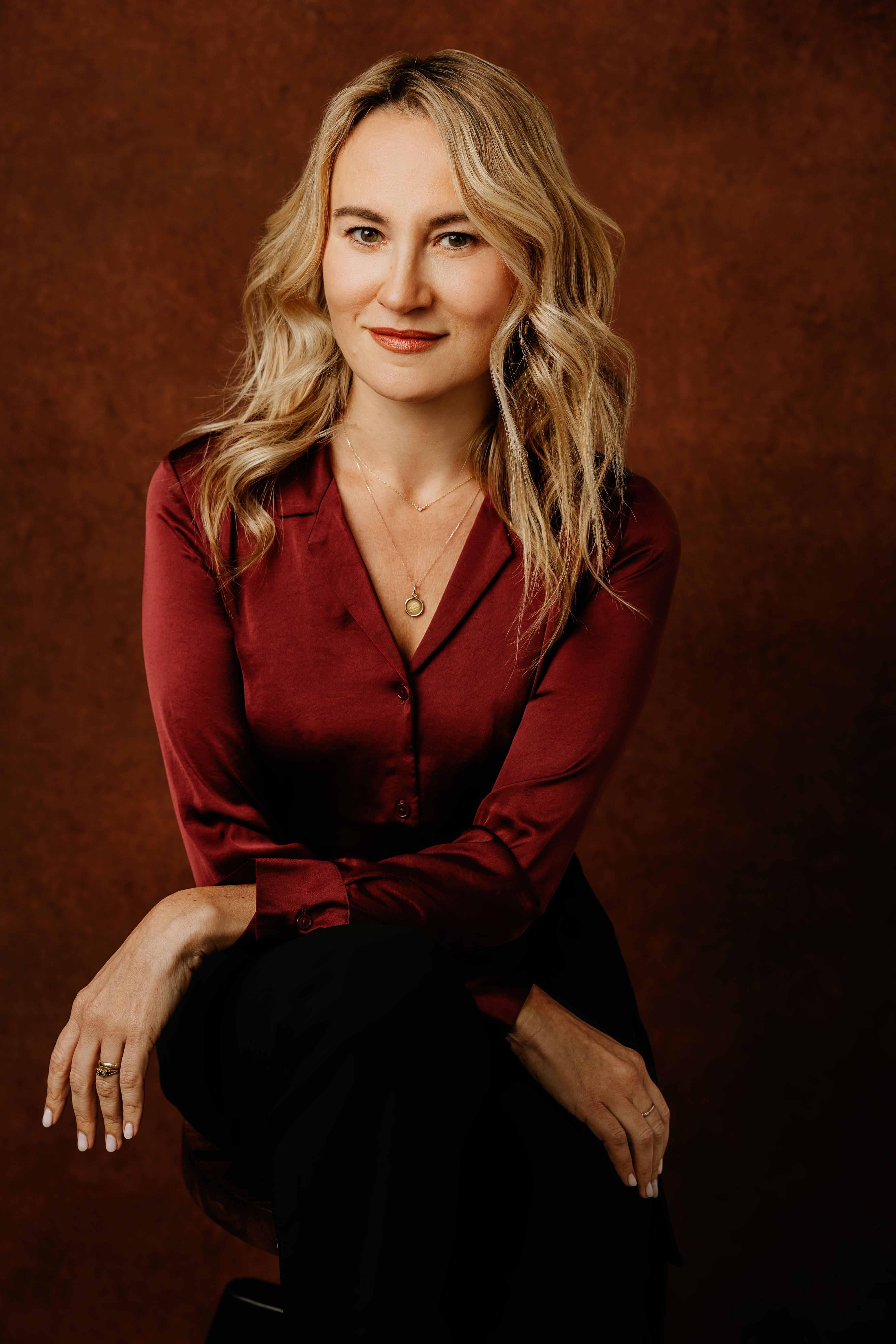
 Mystery Scene: For the fun of it, say The Golden Spoon was a metaphoric literary bake. What kind of treat is it and what are your recipe’s ingredients (influences/inspirations/themes)?
Mystery Scene: For the fun of it, say The Golden Spoon was a metaphoric literary bake. What kind of treat is it and what are your recipe’s ingredients (influences/inspirations/themes)?







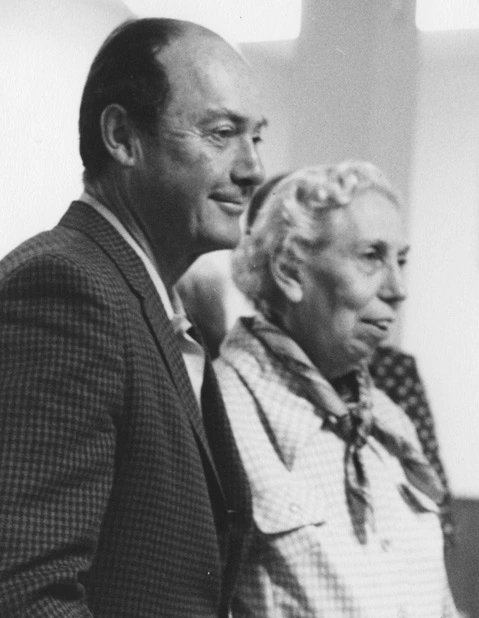
 Southern California native
Southern California native 







